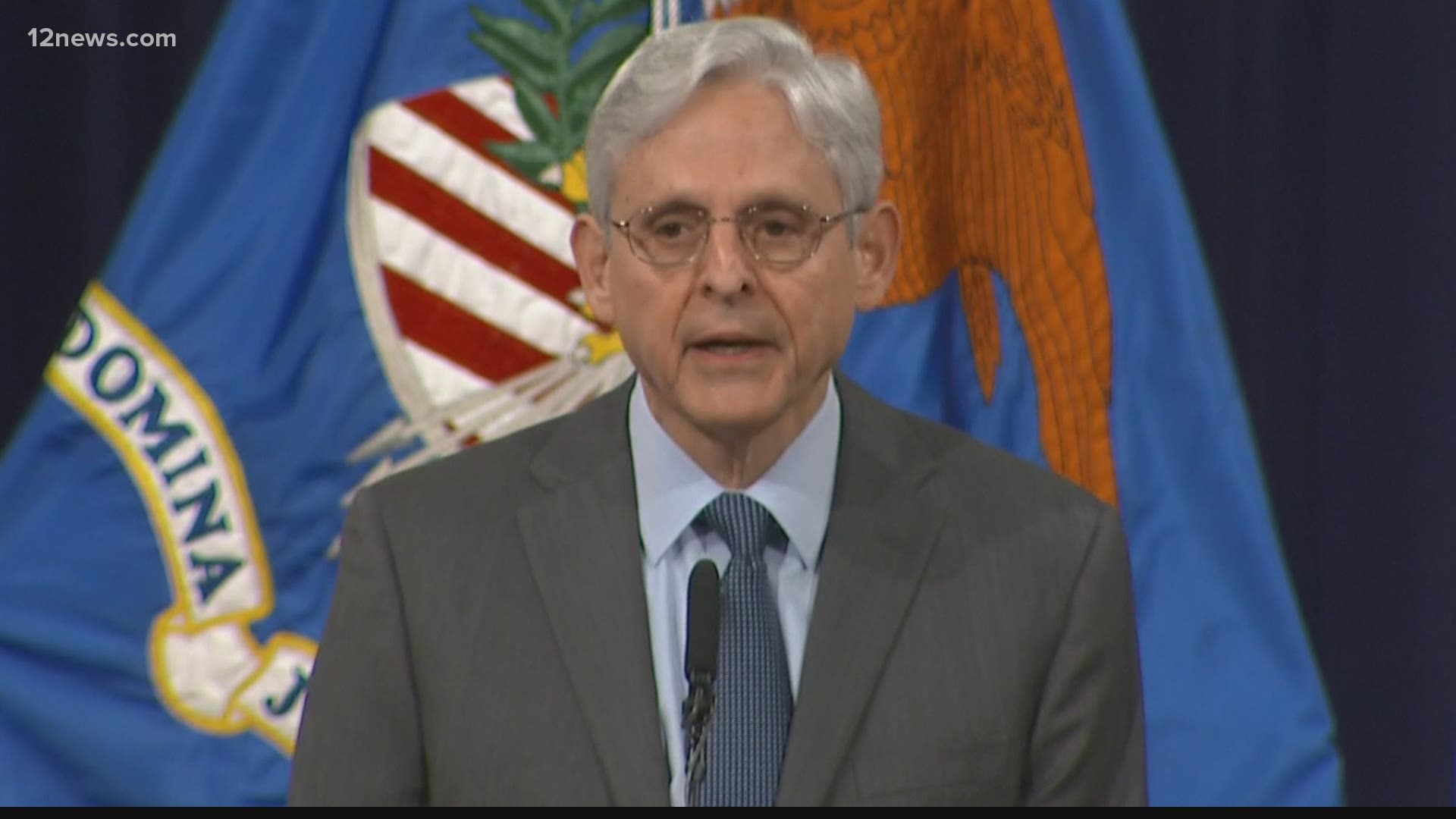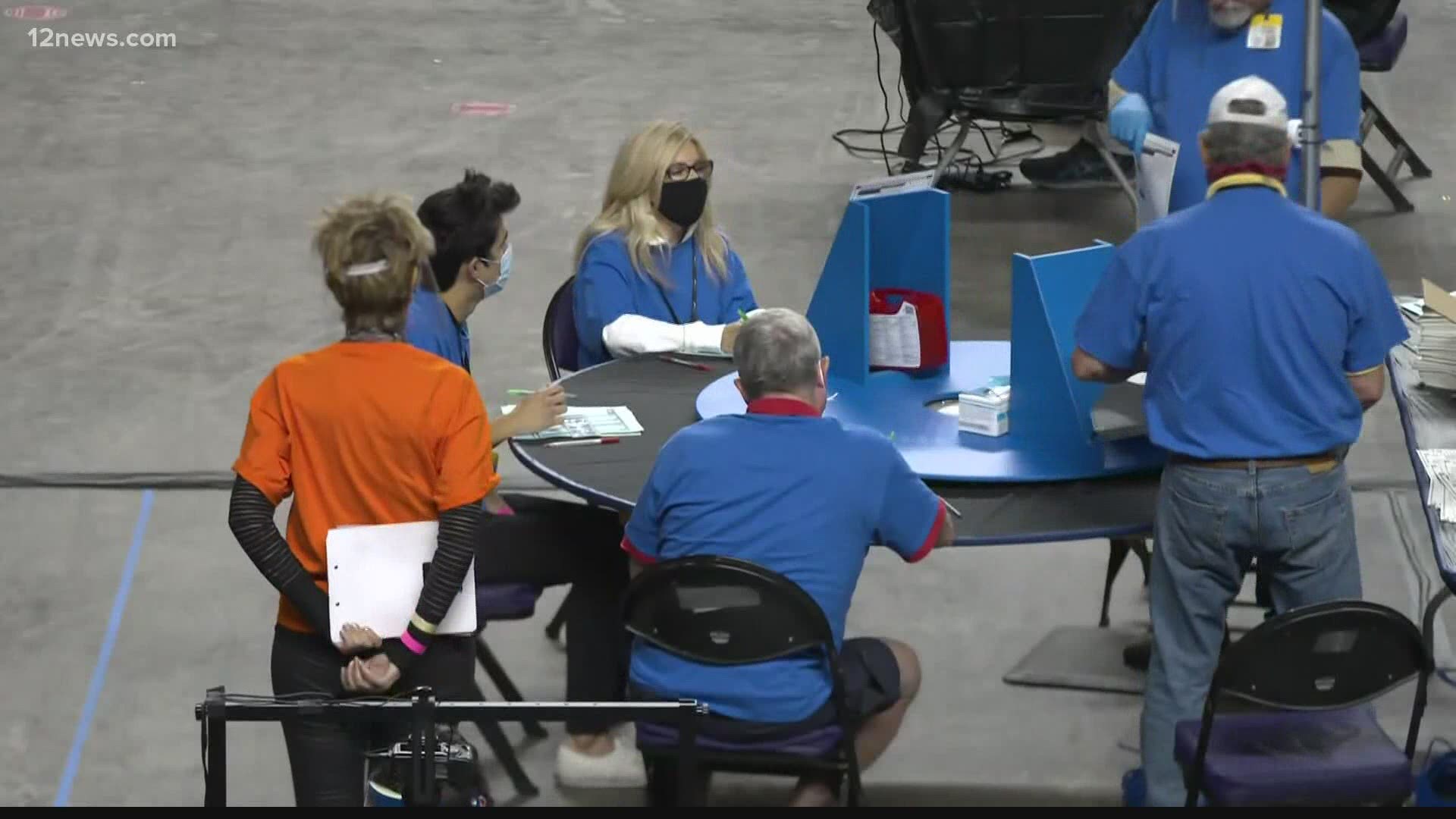PHOENIX — The U.S. Justice Department will be taking a closer look at whether any federal laws were broken by Arizona's partisan election audit, U.S. Attorney General Merrick Garland said Friday, in a sweeping speech laying out his plan to defend voting rights.
While not specifically citing the audit initiated six months ago by Arizona Senate Republicans, Garland said "abnormal" methods were being used in some audits.
"Some jurisdictions, based on disinformation, have utilized abnormal post-election audit methodologies that may put the integrity of the voting process at risk and undermine public confidence in our democracy," Garland said.
Arizona Senate Republicans' audit, authorized by Senate President Karen Fann without a vote of the full Senate, is the country's longest-running and only active 2020 election review.
Garland did allude to a letter to Fann in May from the Justice Department's Civil Rights Division.
The letter expressed concern that the audit leader's plan to canvass door-to-door for voter information might amount to voter intimidation.
Fann responded that the plan had been scrapped.
New DOJ guidance on audits
Garland said in his speech to the staff of the Civil Rights Division that he would double the division's enforcement staff within the next thirty days, in order to deal with challenges to voting rights nationwide.
"We must rededicate the resources of the Department of Justice to a critical part of its original mission: enforcing federal law to protect the franchise for all voters," he said.
Audits like Arizona's will come under scrutiny, Garland said, "to ensure they abide by federal statutory requirements to protect election records and avoid the intimidation of voters."
The DOJ, he said, will also "publish guidance explaining the civil and criminal statutes that apply to post-election audits."
GOP senator warns AG of prison time
Two Arizona Republicans rejected Garland's plan to review the partisan audit, despite federal law that gives the DOJ ample latitude in that role.
Arizona Republican Party Chairwoman Kelli Ward tweeted that Garland was unaware of the Constitution:
Republican State Sen. Wendy Rogers of Flagstaff warned Garland on Twitter that he "would spend time in an Arizona prison" if he touched Arizona election materials.
Rogers is an Air Force veteran and a member of the Oathkeepers, a far-right militia group linked to the Jan. 6 Capitol insurrection.
Timed with Trump's Birthday?
Arizona's unprecedented partisan audit has entered its eighth week at Veterans Memorial Coliseum, at the Arizona State Fairgrounds in Phoenix.
As of Saturday, Republican lawmakers and candidates from at least 13 states had toured the ballot recount and paper scanning on the coliseum floor.
It might be a coincidence, but according to Senate audit spokesman Ken Bennett, the hand recount of 2.1 million Maricopa County ballots is expected to be done Monday.
Monday is also Donald Trump's birthday.
The next step - an examination of the paper ballots - should be complete by June 30, when the Senate's lease for the Coliseum runs out.
That would end the pieces of the multi-part audit that are visible to the public via a live stream.
A full audit report would be furnished to Fann sometime in July or August, according to projections by Bennett and audit spokesman Randy Pullen.
New look in Coliseum
The Coliseum floor has taken on a new look as the ballot review expands.
The color-coded counting tables that have covered the floor for weeks are disappearing. The recount of Maricopa County votes in the 2020 presidential and U.S. Senate elections are winding down.
Taking the place of the counting tables are three-dozen black, rectangular tables with computer screens.
Volunteers will examine the ballots' paper for so-called anomalies linked to conspiracy theories.
The top executive of the Phoenix company that prints the ballots said he's puzzled by what they're looking for.
"We've been doing this for a long time, and some of these questions have just never come up," said Jeff Ellington, chief executive officer of Runbeck Elections.
Ballot exam in 'constant flux'
Ryan Macias, one of three independent elections observers who have written reports for Secretary of State Katie Hobbs, is an expert on election security and technology.
He said the ballot examination was plagued by a lack of transparency.
"The process is in constant flux," he said in an interview. "It's changing on a daily basis or a weekly basis."
The computer software used by ballot examiners has changed week to week, Macias said.
Instructions for ballot examiners also changed last week, according to Macias.
There are now just two instructions for ballot examiners: flag ballots that feel lighter or heavier or textured differently than ballot paper or "any anomaly that cannot be captured by the camera or microscope.''
The computer software will be looking for things like the folds in the ballots, whether the ballot was filled out by a human or a machine, according to Bennett.
"Characteristics about the ballot that confirm or question their authenticity," Bennett said.
Is Jovan Pulitzer involved?
Those are pet conspiracy theories linked to inventor Jovan Pulitzer. His technology reportedly is being used at the audit. Pulitzer has been a leading promoter of election falsehoods, in partnership with the Trump team trying to overturn the election.
"The question has been asked specifically whether or not it was Pulitzer," Macias said.
"We have not been given an answer. But...a worker at one of the stations asked a table manager, and the table manager said, 'Possibly.'"
Macias said he had never seen tests like these on ballots before. The software wouldn't be necessary for post-audit tests done by professional election administrators.
"It fits the narrative," he said of the ballot examination's ties to conspiracy theories. "Is that why it's being conducted? One can only assume."
Maricopa County Election Audit
Track all of our current updates on the Maricopa County Election Audit on our 12 News YouTube channel. Subscribe for updates on all of our new uploads.


